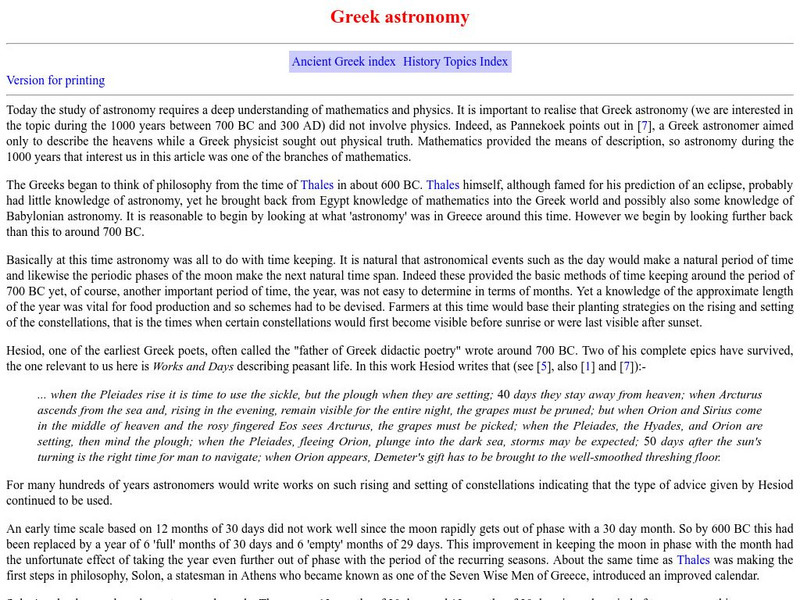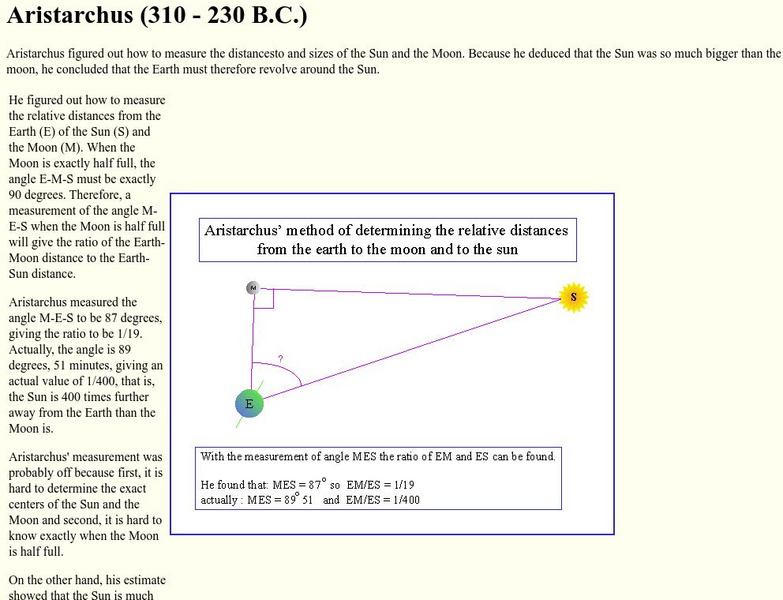Curated OER
Astronomy - Ancient Philosophies
Combine science and social studies with this collection of notes on ancient astronomy. Ideas propagated by early scientists influenced the way people viewed life and our place in the universe. Examine the philosophies of Aristotle,...
Curated OER
Astronomer Research
Students discover the contributions of early astronomers and scientists. For this research skills lesson, students research electronic and print sources about Galileo Galilei, Aristarchus, Hipparchus, Claudius Ptolemy, Nicholas...
Curated OER
May Earth be Revolving around the Sun?
Ninth graders explore how Aristarchus used the position of the half-full Moon to estimate the distance to the Sun, and how he made a great error, but still figured out that the Sun is much larger than Earth.
University of Oregon
University of Oregon: Greek Science: Early Cosmology
Discusses the evolution of ideas about the cosmos, from the Magic Cosmology of the Neolithic age to the stage of Mythical Cosmology, to the Geometric Cosmology of the ancient Greeks. The third stage advocated a rational approach to...
Other
Explorable: Ancient Astronomy, Science and the Ancient Greeks
Discusses the influences of other cultures on ancient Greek astronomers, and the advances made by the Greeks. It highlights major astronomers and those who contributed important ideas from the 6th to the 2nd centuries BC, including...
Other
History World: History of Greek Science
Presents the history of Greek science from the 6th century BC to the 2nd century AD. Navigate using the menu on the left. Covers major figures in science and mathematics, their theories and beliefs, and the influence they had, as well as...
Famous Scientists
Famous Scientists: Aristarchus
Find out about the ancient Greek astronomer and mathematician who presented the first known model that placed the Sun at the center of the known universe with the Earth revolving around it.
University of St. Andrews (UK)
University of St. Andrews: Aristarchus of Samos
This site gives an extensive discussion of Aristarchus' accomplishments in determining the size of the sun and moon and in proposing a sun-centered universe.
University of St. Andrews (UK)
University of St. Andrews: Greek Astronomy
Provides an overview of ancient Greek astronomy and the major figures who played a role in developing ideas about the Universe.
University of Virginia
University of Virginia: How the Greeks Used Geometry to Understand the Stars
An article explaining how the Greeks were able to use their science and mathematics to predict where astronomical objects such as the Planets could be found in the nighttime sky even though their underlying premise was that the earth did...
Cornell University
Cornell University: Astronomy: Aristarchus
This site from Cornell University provides a discussion of how Aristarchus arrived at his conclusions of the distance from the Earth to the Sun and Moon. Also has his methods for determining the size of the Moon and the Sun.
University Corporation for Atmospheric Research
Ucar: High Altitude Observatory: Aristarchus of Samos (310 230 Bc)
A brief biography and discussion of Aristarchus' theories provided here.
Curated OER
Cornell University: Aristarchus
This site from Cornell University provides a discussion of how Aristarchus arrived at his conclusions of the distance from the earth to the sun and moon. Also has his methods for determining the size of the moon and the sun.
Curated OER
Cornell University: Aristarchus
This site from Cornell University provides a discussion of how Aristarchus arrived at his conclusions of the distance from the earth to the sun and moon. Also has his methods for determining the size of the moon and the sun.
Curated OER
University of St Andrews: Aristarchus
This site, which is provided for by the University of St. Andrews, gives an extensive discussion of Aristarchus' accomplishments in determining the size of the sun and moon and in proposing a sun-centered universe.
Curated OER
University of St Andrews: Aristarchus
This site, which is provided for by the University of St. Andrews, gives an extensive discussion of Aristarchus' accomplishments in determining the size of the sun and moon and in proposing a sun-centered universe.












